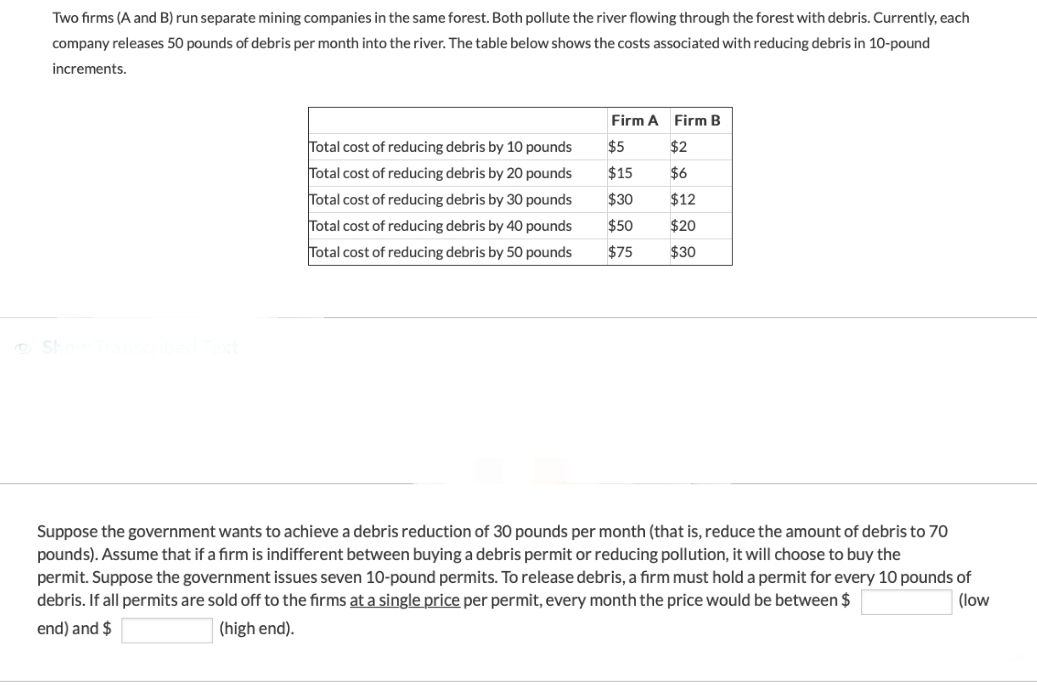Two firms (A and B) run separate mining companies in the same forest. Both pollute the river flowing through the forest with debris. Currently, each company releases 50 pounds of debris per month into the river. The table below shows the costs associated with reducing debris in 10-pound increments. Sh Total cost of reducing debris by 10 pounds Total cost of reducing debris by 20 pounds Total cost of reducing debris by 30 pounds Total cost of reducing debris by 40 pounds Total cost of reducing debris by 50 pounds Firm A Firm B $5 $2 $15 $6 $30 $12 $50 $20 $75 $30 Suppose the government wants to achieve a debris reduction of 30 pounds per month (that is, reduce the amount of debris to 70 pounds). Assume that if a firm is indifferent between buying a debris permit or reducing pollution, it will choose to buy the permit. Suppose the government issues seven 10-pound permits. To release debris, a firm must hold a permit for every 10 pounds of debris. If all permits are sold off to the firms at a single price per permit, every month the price would be between $ end) and $ (low (high end).
Two firms (A and B) run separate mining companies in the same forest. Both pollute the river flowing through the forest with debris. Currently, each company releases 50 pounds of debris per month into the river. The table below shows the costs associated with reducing debris in 10-pound increments. Sh Total cost of reducing debris by 10 pounds Total cost of reducing debris by 20 pounds Total cost of reducing debris by 30 pounds Total cost of reducing debris by 40 pounds Total cost of reducing debris by 50 pounds Firm A Firm B $5 $2 $15 $6 $30 $12 $50 $20 $75 $30 Suppose the government wants to achieve a debris reduction of 30 pounds per month (that is, reduce the amount of debris to 70 pounds). Assume that if a firm is indifferent between buying a debris permit or reducing pollution, it will choose to buy the permit. Suppose the government issues seven 10-pound permits. To release debris, a firm must hold a permit for every 10 pounds of debris. If all permits are sold off to the firms at a single price per permit, every month the price would be between $ end) and $ (low (high end).
Managerial Economics: A Problem Solving Approach
5th Edition
ISBN:9781337106665
Author:Luke M. Froeb, Brian T. McCann, Michael R. Ward, Mike Shor
Publisher:Luke M. Froeb, Brian T. McCann, Michael R. Ward, Mike Shor
Chapter16: Bargaining
Section: Chapter Questions
Problem 16.1IP
Related questions
Question
G.232.

Transcribed Image Text:Two firms (A and B) run separate mining companies in the same forest. Both pollute the river flowing through the forest with debris. Currently, each
company releases 50 pounds of debris per month into the river. The table below shows the costs associated with reducing debris in 10-pound
increments.
Total cost of reducing debris by 10 pounds
Total cost of reducing debris by 20 pounds
Total cost of reducing debris by 30 pounds
Total cost of reducing debris by 40 pounds
Total cost of reducing debris by 50 pounds
Firm A Firm B
$5
$2
$15 $6
$30 $12
$50 $20
$75 $30
Suppose the government wants to achieve a debris reduction of 30 pounds per month (that is, reduce the amount of debris to 70
pounds). Assume that if a firm is indifferent between buying a debris permit or reducing pollution, it will choose to buy the
permit. Suppose the government issues seven 10-pound permits. To release debris, a firm must hold a permit for every 10 pounds of
debris. If all permits are sold off to the firms at a single price per permit, every month the price would be between $
end) and $
(low
(high end).
Expert Solution
This question has been solved!
Explore an expertly crafted, step-by-step solution for a thorough understanding of key concepts.
This is a popular solution!
Trending now
This is a popular solution!
Step by step
Solved in 2 steps

Knowledge Booster
Learn more about
Need a deep-dive on the concept behind this application? Look no further. Learn more about this topic, economics and related others by exploring similar questions and additional content below.Recommended textbooks for you

Managerial Economics: A Problem Solving Approach
Economics
ISBN:
9781337106665
Author:
Luke M. Froeb, Brian T. McCann, Michael R. Ward, Mike Shor
Publisher:
Cengage Learning

Economics: Private and Public Choice (MindTap Cou…
Economics
ISBN:
9781305506725
Author:
James D. Gwartney, Richard L. Stroup, Russell S. Sobel, David A. Macpherson
Publisher:
Cengage Learning

Microeconomics: Private and Public Choice (MindTa…
Economics
ISBN:
9781305506893
Author:
James D. Gwartney, Richard L. Stroup, Russell S. Sobel, David A. Macpherson
Publisher:
Cengage Learning

Managerial Economics: A Problem Solving Approach
Economics
ISBN:
9781337106665
Author:
Luke M. Froeb, Brian T. McCann, Michael R. Ward, Mike Shor
Publisher:
Cengage Learning

Economics: Private and Public Choice (MindTap Cou…
Economics
ISBN:
9781305506725
Author:
James D. Gwartney, Richard L. Stroup, Russell S. Sobel, David A. Macpherson
Publisher:
Cengage Learning

Microeconomics: Private and Public Choice (MindTa…
Economics
ISBN:
9781305506893
Author:
James D. Gwartney, Richard L. Stroup, Russell S. Sobel, David A. Macpherson
Publisher:
Cengage Learning


Managerial Economics: Applications, Strategies an…
Economics
ISBN:
9781305506381
Author:
James R. McGuigan, R. Charles Moyer, Frederick H.deB. Harris
Publisher:
Cengage Learning